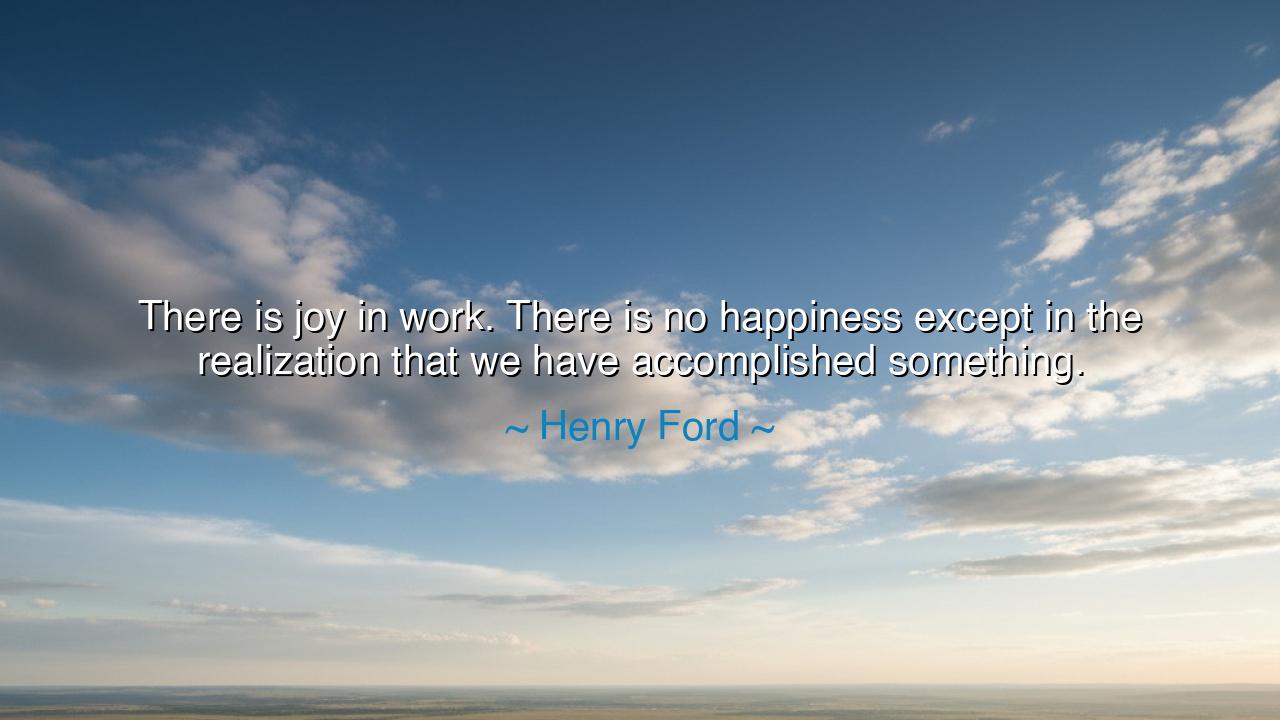
There is joy in work. There is no happiness except in the
There is joy in work. There is no happiness except in the realization that we have accomplished something.






The great industrialist Henry Ford, a man whose hands and mind reshaped the modern world, once said, “There is joy in work. There is no happiness except in the realization that we have accomplished something.” These words, spoken by one who turned raw steel into motion and dream into industry, carry within them a truth that transcends time: that labor, when joined with purpose, becomes not a burden but a source of joy. For the act of creating, of building, of seeing one’s effort bear fruit — this is the sacred rhythm that binds humanity to progress and meaning.
To understand this saying, one must look into the heart of Ford’s life. Born on a farm in the mid-19th century, he did not inherit wealth or ease. His was a world of toil and repetition, where progress came slowly and by hand. Yet in that world of sweat and soil, Ford found not despair, but fascination — a desire to make work better, smarter, more human. Through years of failure, experimentation, and persistence, he discovered a joy not in leisure, but in creation. The Model T, the assembly line, the revolution that changed how men and women labored — all these sprang from the truth he spoke: that real happiness blooms only when one creates something of worth, when effort meets vision and becomes reality.
There is joy in work, he said — not in endless labor for its own sake, but in the realization of purpose through effort. This is a truth the ancients too proclaimed. The Greeks spoke of ergon, the noble labor by which man fulfills his nature. They believed that to work well was to live well, for through work one contributes to the harmony of the world. So too did Ford understand that idleness, though tempting, breeds emptiness. The soul, like the body, decays when left unused. It is through labor — creative, sincere, and disciplined — that the human spirit rises above mediocrity and finds dignity.
History is filled with the living proof of this wisdom. Consider Michelangelo, who spent years beneath the dome of the Sistine Chapel, his hands aching, his back bent, his eyes strained by candlelight — and yet, in that suffering, he knew joy. For every brushstroke was an act of devotion; every hour of exhaustion brought him closer to the birth of something eternal. Or consider Marie Curie, who toiled endlessly in her small laboratory, sifting through tons of material to find the hidden radiance within. Her work consumed her strength, but it gave her purpose, and through it she gifted light to the world. Like Ford, they understood that work is the altar upon which meaning is forged.
But Ford’s wisdom also warns against the illusion of happiness without creation. “There is no happiness except in the realization that we have accomplished something.” How many in the modern age chase pleasure, only to find emptiness? How many mistake comfort for contentment? The truth is simple: happiness cannot be bought, borrowed, or inherited — it must be earned. It is born in the heart of those who have struggled, who have labored through doubt, and who have at last seen the fruits of their endurance. When the craftsman holds his finished work, when the teacher sees her student flourish, when the farmer watches his harvest rise — that is happiness, pure and unshakable.
Accomplishment, then, is not measured by grandeur, but by sincerity. To mend a broken thing, to comfort another soul, to perfect one’s craft — these too are triumphs. What matters is not how much we do, but how deeply we engage with what we do. The joy Ford spoke of is the joy of participation in creation, of knowing that one’s time and energy have not been wasted. Even the smallest task, done with intention, carries the seed of greatness.
So, my child, remember this: do not flee from work, for it is not your enemy. It is the forge that shapes your character and reveals your strength. Approach your labor not with resentment, but with reverence — for through it you honor both yourself and the world. Work not merely for gain, but for growth. Strive to accomplish something each day, even if it is small, and you will find a quiet, enduring happiness that no luxury can replace. For as Henry Ford taught us, joy and accomplishment are not the rewards of ease, but the fruits of effort. When your hands and heart move together in purpose, you will know the truest kind of joy — the joy of a life that has built something worthy of its breath.






AAdministratorAdministrator
Welcome, honored guests. Please leave a comment, we will respond soon